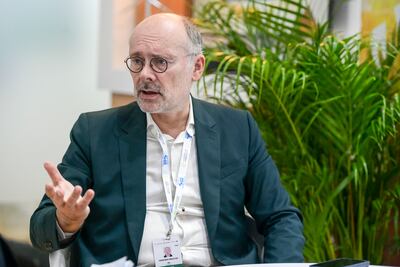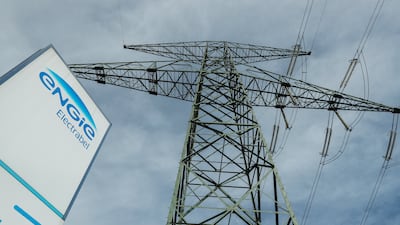France’s Engie is looking to boost its operations in the GCC's renewables sector and make the most of opportunities, a senior executive has said.
“Renewables is top of the agenda,” Frederic Claux, Engie’s country manager for the GCC and Pakistan, told The National at the Abu Dhabi Sustainability Week event.
“We want to grow this business in the region and are following up on a few transactions that have been announced recently.”
The UAE and Saudi Arabia, the Arab world’s two largest economies, are boosting their investments in renewables as they aim to achieve net-zero emission targets in the coming decades.
The UAE, Opec's third largest oil producer, has planned Dh600 billion ($163.37 billion) worth of clean and renewable energy investments over the next three decades.
Saudi Arabia aims to grow the share of gas and renewable energy in its power mix to 50 per cent by 2030. Last year, it launched five new renewable energy projects to produce electricity sustainably, as the kingdom, the world's largest exporter of oil, pursues a goal of net-zero emissions by 2060.
Engie is reviewing its options with regards to new wind project bids in Saudi Arabia as well as the 1.5 gigawatts Al Ajban solar plant in Abu Dhabi, Mr Claux said.
The company is also involved in a smaller-scale 30 megawatts solar project in Saudi Arabia in partnership with the kingdom’s National Agricultural Development Company.
It aims to finance projects through a mix of debt and equity, he said.
Global renewable power capacity growth is on track to nearly double in the next five years, overtaking coal as the largest source of electricity generation, the International Energy Agency said last month.
Renewable power capacity is expected to grow by 2,400 gigawatts by 2027, equivalent to the current power capacity of China, the world’s second largest economy, the IEA said.
Paris-listed Engie is bullish on GCC growth as its economies recover from the coronavirus pandemic on the back of higher oil prices and new government initiatives.
“The region is booming because of a lot of liquidity and there is a willingness to invest in new solutions to decarbonise businesses, not only the energy business, but also energy-intensive industries like cement factories and steel factories,” said Mr Claux, who is also Engie's managing director for thermal and supply for Asia, Middle East and Africa.
Last year, the UAE Ministry of Energy and Infrastructure signed a preliminary agreement with Engie Solutions, a subsidiary of Engie, to develop clean energy projects and support the country's decarbonisation goals.
The GCC region currently accounts for 15 per cent of the company’s total annual revenue. That share is anticipated to grow in the coming years as Engie bids for new projects and expands its operations.
“We want to win a few projects and increase our business in the region,” Mr Claux said, without divulging expected revenue growth from the region.
“The key countries are the UAE and Saudi Arabia and, to an extent, Qatar.”
Engie reported an 85 per cent surge in its revenue for the first nine months of 2022 to €69.3 billion ($75 billion). It added 2.5 gigawatts in renewables capacity during the period, according to its financial statement.
It is accelerating renewables development internationally with plans to add 4 gigawatts on average per year of capacity until 2025.
The company wants to increase its renewable energy capacity to 80 gigawatts by 2030, from 35 gigawatts at present.
The company was not affected by the Russia-Ukraine conflict, but faced supply chain disruptions as a result of coronavirus lockdowns in China, Mr Claux said.
Looking ahead, Engie plans to invest in Saudi Arabia’s $500 billion Neom project across renewables, desalination, district cooling, engineering services and data centres, as part of its expansion plans.
“There is a whole spectrum of possibilities and we are engaging with them on different fronts,” he said.
Green hydrogen is also an area of focus for Engie as demand for the low-carbon fuel rises globally.
“We formed a partnership with Masdar and won a couple of projects … we are looking into Oman and Saudi Arabia at the moment,” Mr Claux said.
Mountain%20Boy
%3Cp%3E%3Cstrong%3EDirector%3A%3C%2Fstrong%3E%20Zainab%20Shaheen%3C%2Fp%3E%0A%3Cp%3E%3Cstrong%3EStarring%3A%3C%2Fstrong%3E%20Naser%20Al%20Messabi%3C%2Fp%3E%0A%3Cp%3E%3Cstrong%3ERating%3C%2Fstrong%3E%3A%203%2F5%3C%2Fp%3E%0A
Five expert hiking tips
Always check the weather forecast before setting off
Make sure you have plenty of water
Set off early to avoid sudden weather changes in the afternoon
Wear appropriate clothing and footwear
Take your litter home with you
Points Classification
1. Marcel Kittel (Germany / Quick-Step) 63
2. Arnaud Demare (France / FDJ) 38
3. Andre Greipel (Germany / Lotto) 25
4. Sonny Colbrelli (Italy / Bahrain) 24
5. Mark Cavendish (Britain / Dimension Data) 22
6. Taylor Phinney (U.S. / Cannondale) 21
7. Geraint Thomas (Britain / Team Sky) 20
8. Thomas Boudat (France / Direct Energie) 20
9. Stefan Kueng (Switzerland / BMC Racing) 17
10. Michael Matthews (Australia / Sunweb) 17
ABU DHABI ORDER OF PLAY
Starting at 10am:
Daria Kasatkina v Qiang Wang
Veronika Kudermetova v Annet Kontaveit (10)
Maria Sakkari (9) v Anastasia Potapova
Anastasia Pavlyuchenkova v Ons Jabeur (15)
Donna Vekic (16) v Bernarda Pera
Ekaterina Alexandrova v Zarina Diyas
Results
Stage three:
1. Stefan Bissegger (SUI) EF Education-EasyPost, in 9-43
2. Filippo Ganna (ITA) Ineos Grenadiers, at 7s
3. Tom Dumoulin (NED) Jumbo-Visma, at 14s
4. Tadej Pogacar (SLO) UAE-Team Emirates, at 18s
5. Joao Almeida (POR) UAE-Team Emirates, at 22s
6. Mikkel Bjerg (DEN) UAE-Team Emirates, at 24s
General Classification:
1. Stefan Bissegger (SUI) EF Education-EasyPost, in 9-13-02
2. Filippo Ganna (ITA) Ineos Grenadiers, at 7s
3. Jasper Philipsen (BEL) Alpecin Fenix, at 12s
4. Tom Dumoulin (NED) Jumbo-Visma, at 14s
5. Tadej Pogacar (SLO) UAE-Team Emirates, at 18s
6. Joao Almeida (POR) UAE-Team Emirates, at 22s
Most sought after workplace benefits in the UAE
- Flexible work arrangements
- Pension support
- Mental well-being assistance
- Insurance coverage for optical, dental, alternative medicine, cancer screening
- Financial well-being incentives
DAY%20ONE%20RESULT
%3Cp%3E%3Cbr%3E1.%20Charlotte%20Kool%20(NED)%20%E2%80%93%20Team%20DSM%3A%202hrs%2C%2047min%2C%2014sec%3Cbr%3E2.%20Lorena%20Wiebes%20(NED)%20%E2%80%93%20Team%20SD%20Worx%3A%20%2B4%20secs%3Cbr%3E3.%20Chiara%20Consonni%20(ITA)%20%E2%80%93%20UAE%20Team%20ADQ%3A%20%2B5%20secs%3C%2Fp%3E%0A
UFC Fight Night 2
1am – Early prelims
2am – Prelims
4am-7am – Main card
7:30am-9am – press cons
The Breadwinner
Director: Nora Twomey
Starring: Saara Chaudry, Soma Chhaya, Laara Sadiq
Three stars
The years Ramadan fell in May
Key facilities
- Olympic-size swimming pool with a split bulkhead for multi-use configurations, including water polo and 50m/25m training lanes
- Premier League-standard football pitch
- 400m Olympic running track
- NBA-spec basketball court with auditorium
- 600-seat auditorium
- Spaces for historical and cultural exploration
- An elevated football field that doubles as a helipad
- Specialist robotics and science laboratories
- AR and VR-enabled learning centres
- Disruption Lab and Research Centre for developing entrepreneurial skills
How to wear a kandura
Dos
- Wear the right fabric for the right season and occasion
- Always ask for the dress code if you don’t know
- Wear a white kandura, white ghutra / shemagh (headwear) and black shoes for work
- Wear 100 per cent cotton under the kandura as most fabrics are polyester
Don’ts
- Wear hamdania for work, always wear a ghutra and agal
- Buy a kandura only based on how it feels; ask questions about the fabric and understand what you are buying
UAE currency: the story behind the money in your pockets
COMPANY%20PROFILE
%3Cp%3E%3Cstrong%3EName%3A%20%3C%2Fstrong%3EEjari%3Cbr%3E%3Cstrong%3EBased%3A%20%3C%2Fstrong%3ERiyadh%2C%20Saudi%20Arabia%3Cbr%3E%3Cstrong%3EFounders%3A%20%3C%2Fstrong%3EYazeed%20Al%20Shamsi%2C%20Fahad%20Albedah%2C%20Mohammed%20Alkhelewy%20and%20Khalid%20Almunif%3Cbr%3E%3Cstrong%3ESector%3A%20%3C%2Fstrong%3EPropTech%3Cbr%3E%3Cstrong%3ETotal%20funding%3A%20%3C%2Fstrong%3E%241%20million%3Cbr%3E%3Cstrong%3EInvestors%3A%20%3C%2Fstrong%3ESanabil%20500%20Mena%2C%20Hambro%20Perks'%20Oryx%20Fund%20and%20angel%20investors%3Cbr%3E%3Cstrong%3ENumber%20of%20employees%3A%20%3C%2Fstrong%3E8%3C%2Fp%3E%0A
Inside%20Out%202
%3Cp%3E%3Cstrong%3EDirector%3A%C2%A0%3C%2Fstrong%3EKelsey%20Mann%3C%2Fp%3E%0A%3Cp%3E%3Cstrong%3EStarring%3A%3C%2Fstrong%3E%C2%A0Amy%20Poehler%2C%20Maya%20Hawke%2C%20Ayo%20Edebiri%3C%2Fp%3E%0A%3Cp%3E%3Cstrong%3ERating%3A%20%3C%2Fstrong%3E4.5%2F5%3C%2Fp%3E%0A
Zayed Sustainability Prize
BUNDESLIGA FIXTURES
Friday (all kick-offs UAE time)
Hertha Berlin v Union Berlin (10.30pm)
Saturday
Freiburg v Werder Bremen (5.30pm)
Paderborn v Hoffenheim (5.30pm)
Wolfsburg v Borussia Dortmund (5.30pm)
Borussia Monchengladbach v Bayer Leverkusen (5.30pm)
Bayern Munich v Eintracht Frankfurt (5.30pm)
Sunday
Schalke v Augsburg (3.30pm)
Mainz v RB Leipzig (5.30pm)
Cologne v Fortuna Dusseldorf (8pm)
MATCH INFO
Uefa Champions League semi-final:
First leg: Liverpool 5 Roma 2
Second leg: Wednesday, May 2, Stadio Olimpico, Rome
TV: BeIN Sports, 10.45pm (UAE)
COMPANY%20PROFILE
%3Cp%3ECompany%20name%3A%20CarbonSifr%3Cbr%3EStarted%3A%202022%3Cbr%3EBased%3A%20Dubai%3Cbr%3EFounders%3A%20Onur%20Elgun%2C%20Mustafa%20Bosca%20and%20Muhammed%20Yildirim%3Cbr%3ESector%3A%20Climate%20tech%3Cbr%3EInvestment%20stage%3A%20%241%20million%20raised%20in%20seed%20funding%3Cbr%3E%3C%2Fp%3E%0A
UAE currency: the story behind the money in your pockets
FIXTURES (all times UAE)
Sunday
Brescia v Lazio (3.30pm)
SPAL v Verona (6pm)
Genoa v Sassuolo (9pm)
AS Roma v Torino (11.45pm)
Monday
Bologna v Fiorentina (3.30pm)
AC Milan v Sampdoria (6pm)
Juventus v Cagliari (6pm)
Atalanta v Parma (6pm)
Lecce v Udinese (9pm)
Napoli v Inter Milan (11.45pm)
The biog
Born: High Wycombe, England
Favourite vehicle: One with solid axels
Favourite camping spot: Anywhere I can get to.
Favourite road trip: My first trip to Kazakhstan-Kyrgyzstan. The desert they have over there is different and the language made it a bit more challenging.
Favourite spot in the UAE: Al Dhafra. It’s unique, natural, inaccessible, unspoilt.
Five famous companies founded by teens
There are numerous success stories of teen businesses that were created in college dorm rooms and other modest circumstances. Below are some of the most recognisable names in the industry:
- Facebook: Mark Zuckerberg and his friends started Facebook when he was a 19-year-old Harvard undergraduate.
- Dell: When Michael Dell was an undergraduate student at Texas University in 1984, he started upgrading computers for profit. He starting working full-time on his business when he was 19. Eventually, his company became the Dell Computer Corporation and then Dell Inc.
- Subway: Fred DeLuca opened the first Subway restaurant when he was 17. In 1965, Mr DeLuca needed extra money for college, so he decided to open his own business. Peter Buck, a family friend, lent him $1,000 and together, they opened Pete’s Super Submarines. A few years later, the company was rebranded and called Subway.
- Mashable: In 2005, Pete Cashmore created Mashable in Scotland when he was a teenager. The site was then a technology blog. Over the next few decades, Mr Cashmore has turned Mashable into a global media company.
- Oculus VR: Palmer Luckey founded Oculus VR in June 2012, when he was 19. In August that year, Oculus launched its Kickstarter campaign and raised more than $1 million in three days. Facebook bought Oculus for $2 billion two years later.
Real estate tokenisation project
Dubai launched the pilot phase of its real estate tokenisation project last month.
The initiative focuses on converting real estate assets into digital tokens recorded on blockchain technology and helps in streamlining the process of buying, selling and investing, the Dubai Land Department said.
Dubai’s real estate tokenisation market is projected to reach Dh60 billion ($16.33 billion) by 2033, representing 7 per cent of the emirate’s total property transactions, according to the DLD.
MOUNTAINHEAD REVIEW
Starring: Ramy Youssef, Steve Carell, Jason Schwartzman
Director: Jesse Armstrong
Rating: 3.5/5



